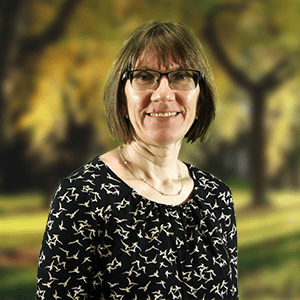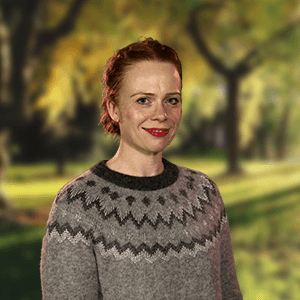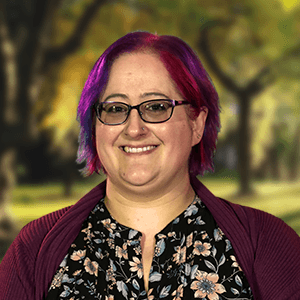Educational Research Group
This group of educational researchers focus primarily on the design, delivery and assessment of pharmacy practice and science-rich content for both undergraduate and postgraduate students, with particular pedagogical expertise in the following areas:
- Warren S, Black P, Mills E. 2015. Online induction programme with webinar: a case study. Journal of Applied Research in Higher Education, 123-132, vol. 7(1). doi>
- Warren SL. 2013. Delivering learning material virtually in the event of adverse weather. The Pharmaceutical Journal, 355, vol. 290.
- Allinson MD, Black PE, White SJ. 2021. Exploring Experiences of UK Pharmacy Graduates in Dealing with Professional Dilemmas in Transition to Practice. Am J Pharm Educ, 8643. link> doi> full text>
- Allinson M, White S, Black P. 2021. Pharmacy graduates' perceived impact of long-term undergraduate use of an ethical decision-support tool on their early practice. Curr Pharm Teach Learn, 760-769, vol. 13(7). link> doi> full text>
- Allinson MD and Black P. 2017. Students views of an online ethical decision-support tool. Currents in Pharmacy Teaching and Learning. doi> link>
- Choudhry Y and Allinson M. 2016. Pharmacy students’ views of their code of conduct. International Journal of Pharmacy Practice.
- Lawson C, Pati S, Green J, Messina G, Strömberg A, Nante N, Golinelli D, Verzuri A, White S, Jaarsma T, Walsh P, Lonsdale P, Kadam UT. 2017. Development of an international comorbidity education framework. Nurse Educ Today, 82-89, vol. 55. link> doi> full text>
- Allinson MD. 2015. The practice pharmacist in action – evaluation of a teaching module. International Journal of Pharmacy Practice.
- White S, Clyne W, Mshelia C. 2013. An educational framework for managing and supporting medication adherence in Europe. Pharmacy Education, 118-120, vol. 13.
- White S, Gifford A, Frisher M. 2021. Experiential learning in public health: evaluation of a health promotion campaign assessment for pharmacy students. Pharmacy Education, 56-64, vol. 21. doi> link> full text>
- Cooper A and Thompson J. 2020. Conducting competency-based assessments during the COVID-19 pandemic: Moving to remote assessments. Pharmacy Education, 31-32. doi> link> full text>
- Richardson A, Curtis ADM, Moss GP, Pearson RJ, White S, Rutten FJM, Perumal D, Maddock K. 2014. Simulated drug discovery process to conduct a synoptic assessment of pharmacy students. Am J Pharm Educ, 41, vol. 78(2). link> doi>
- Berry JD, Maddock K, Chapman S. 2019. Stereotypical behaviours of healthcare students in interprofessional clinical simulations. International Journal of Pharmacy Practice, vol. 27 (S2), 10-11
- Pearson RJ. 2019. Exploring Peer Instruction: Should Cohort Clicker Responses Appear During or After Polling?. Journal of Chemical Education, 873-879, vol. 96(5). link> doi> full text>
- Pearson RJ. 2020. Online Chemistry Crossword Puzzles prior to and during COVID-19: Light-Hearted Revision Aids That Work. Journal of Chemical Education, 3194-3200, vol. 97(Insights Gained While Teaching Chemistry in the Time of COVID-19). doi> link> full text>
- Pearson RJ. 2020. Clickers versus Plickers: Comparing Two Audience Response Systems in a Smartphone-Free Teaching Environment. Journal of Chemical Education, 2342-2346, vol. 97(8). doi> link> full text>
- Pearson RJ. 2017. Tailoring Clicker Technology to Problem-Based Learning: What's the Best Approach?. Journal of Chemical Education, 1866-1872, vol. 94(12). link> doi>
- Jacklin S, Maskrey N, Chapman S. 2021. Shared Decision-Making With a Virtual Patient in Medical Education: Mixed Methods Evaluation Study. JMIR Med Educ, e22745, vol. 7(2). link> doi>
- Richardson CL, Chapman S, White S. 2021. Measuring the educational benefits of using a virtual patient to practice pharmacist-patient consultations. Pharmacy Education, 382-389, vol. 21. link> doi> link> full text>
- Richardson CL, Chapman S, White S. 2021. Experiencing a virtual patient to practice patient counselling skills. Currents in Pharmacy Teaching and Learning. doi> link> full text>
- Thompson J, White S, Chapman S. 2020. Virtual patients as a tool for training pre-registration pharmacists and increasing their preparedness to practice: A qualitative study. PLoS One, e0238226, vol. 15(8). link> doi> full text>
- Thompson J, White S, Chapman S. 2020. Actual vs. Perceived Competency Development-How Can Virtual Patients Impact Pharmacist Pre-Registration Training?. Pharmacy (Basel), vol. 8(3). link> doi> full text>
- Thompson J, White S, Chapman S. 2020. Interactive Clinical Avatar Use in Pharmacist Preregistration Training: Design and Review. Journal of Medical Internet Research, e17146, vol. 22(11). link> doi> full text>
- Richardson CL, White S, Chapman S. 2019. Virtual patient technology to educate pharmacists and pharmacy students on patient communication: a systematic review. BMJ Simulation and Technology Enhanced Learning, 332-338, vol. 6(6). doi> full text>
- Jacklin S, Maskrey N, Chapman S. 2019. Design and initial testing of a virtual patient as part of a workshop to improve person-centred care. Pharmacoepidemiology and Drug Safety (p. 4, vol. 28). link>
- Jacklin S, Maskrey N, Chapman S. 2018. Improving Shared Decision Making Between Patients and Clinicians: Design and Development of a Virtual Patient Simulation Tool. JMIR Med Educ, e10088, vol. 4(2). link> doi> full text>
- Chapman SR, White S, Richardson CL. 2018. Virtual patient educational programme to teach counselling to clinical pharmacists: development and proof of concept. BMJ Simulation and Technology Enhanced Learning. doi> full text>
- Mackumbi N and Allinson M. 2013. Students' perspectives on using real and simulated patients to develop communication skills. International Journal of Pharmacy Practice, 7-8, vol. 21.
- Voisey CL. 2018. Generation (Wh) Y; The Digital Face of Pharmaceutical Education. Open Access Journal of Pharmaceutical Research, vol. 2(1). doi> full text>
- Voisey C. 2015. The potential for virtual worlds in Higher Education: A short literature review. Journal of Academic Development and Education. full text>
Our researchers

Shane Artis
Lecturer in Postgraduate Pharmacy Education
- Hornbeam 2.06
- +44 (0)1782 733277
- s.artis@keele.ac.uk

Wendy Clark
Academic Clinical Educator (postgraduate)
- Hornbeam 2.12
- 01782 734784
- w.k.clark@keele.ac.uk

Alison Cooper
Lecturer in Pharmacy Practice
- Hornbeam 1.24
- +44 (0)1782 733447
- a.cooper1@keele.ac.uk

Dr Martin Frisher
Reader in Health Services Research
- Hornbeam 1.48
- +44 (0)1782 733568
- m.frisher@keele.ac.uk

Karen Anne Gunnell
Senior Lecturer in Pharmacy Practice
- Hornbeam 1.24
- +44 (0)1782 734950
- k.gunnell@keele.ac.uk

Dr Simon Jacklin
Lecturer in Pharmacy Practice, Director of Education
- Hornbeam 1.24
- +44 (0)1782 734792
- s.jacklin@keele.ac.uk

Daxa Knowles
Clinical Pharmacy Practice Programme Manager
- Hornbeam 2.12
- +44 (0)1782 733561
- d.knowles@keele.ac.uk

Professor Katie Maddock
Head of School
- Hornbeam 3.08
- +44 (0)1782 734789
- k.maddock@keele.ac.uk

Professor Peter Ogrodnik
Senior Lecturer Medical Devices Design
- Guy Hilton Research Centre
- +44 (0)1782 674996
- p.ogrodnik@keele.ac.uk

Rose-Marie O’Byrne
Academic Postgraduate Pharmacist Educator
- Hornbeam 2.06
- +44 (0)1782 734763
- r.o’byrne@keele.ac.uk

Michaela Probert
Independent Prescribing Programme Manager
- Hornbeam 2.12
- +44 (0)1782 734203
- m.probert@keele.ac.uk

Dr Jessica Thompson
Lecturer in Clinical and Professional Practice
- Hornbeam 1.24
- +44 (0)1782 733983
- j.f.thompson@keele.ac.uk

Dr Rebecca Hayley Venables
Senior Lecturer in Clinical Pharmacy
- Hornbeam 2.16
- +44 (0)1782 733573
- r.h.venables@keele.ac.uk

Dr Carolyn Voisey
Lecturer in Physiology
- Hornbeam 0.54
- +44 (0)1782 733876
- c.l.voisey@keele.ac.uk

Professor Simon White
Director of Postgraduate Education, Professor of Pharmacy Practice
- Hornbeam 2.04
- +44 (0)1782 734772
- s.j.white@keele.ac.uk


